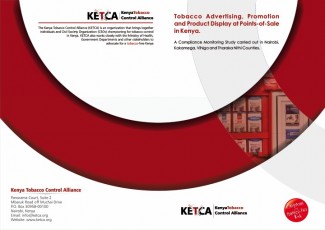Tobacco Advertising, Promotion and Tobacco Product Display at Points-of-Sale in Kenya

In 2007, Kenya enacted the Tobacco Control Act, which is the principal tobacco control law in the country. The 2007 law includes prohibition of smoking in public places, ban on tobacco advertising, promotion and sponsorship, and packaging and labeling of tobacco products. This comprehensive law bans virtually all direct and indirect forms of advertising and promotion of tobacco products, including points of sale (POS) advertising and promotion such as product stacking or product displays of any kind or size. There are few exceptions among the regulated forms of tobacco advertising and promotion, including on tobacco packaging, labeling and inserts, reverse brand stretching and a few promotional provisions.
Tobacco control in the country is becoming increasingly important as major tobacco industry players such as the British American Tobacco (BAT) and Mastermind Tobacco Kenya Limited (MTKL) have continued to push their products on Kenya’s youth and adult populations. There are three major tobacco companies operating in Kenya: British American Tobacco (BAT), Mastermind Tobacco Kenya Limited (MTKL) and Philip Morris International (PMI) that accounts for 77.1%, 17.2% and 4.2% of the total retail volume sales in the country respectively.
In November 2017, Kenya Tobacco Control Alliance (KETCA) in collaboration with the Campaign for Tobacco-Free Kids (CTFK) conducted a compliance study to monitor the level of compliance with tobacco advertising, promotion and sponsorship (TAPS) provisions under the Tobacco Control Act.
The study revealed that:
- Out of the 400 vendors visited 99.25% had at least one form of tobacco advertising or promotion
- Excluding display of tobacco products, about 97% of the vendors were compliant and 3% were non-compliant with advertising regulations
- Display of tobacco products was found to be the most commonly observed TAPS violation with about 98.25% tobacco products being displayed at the POS
